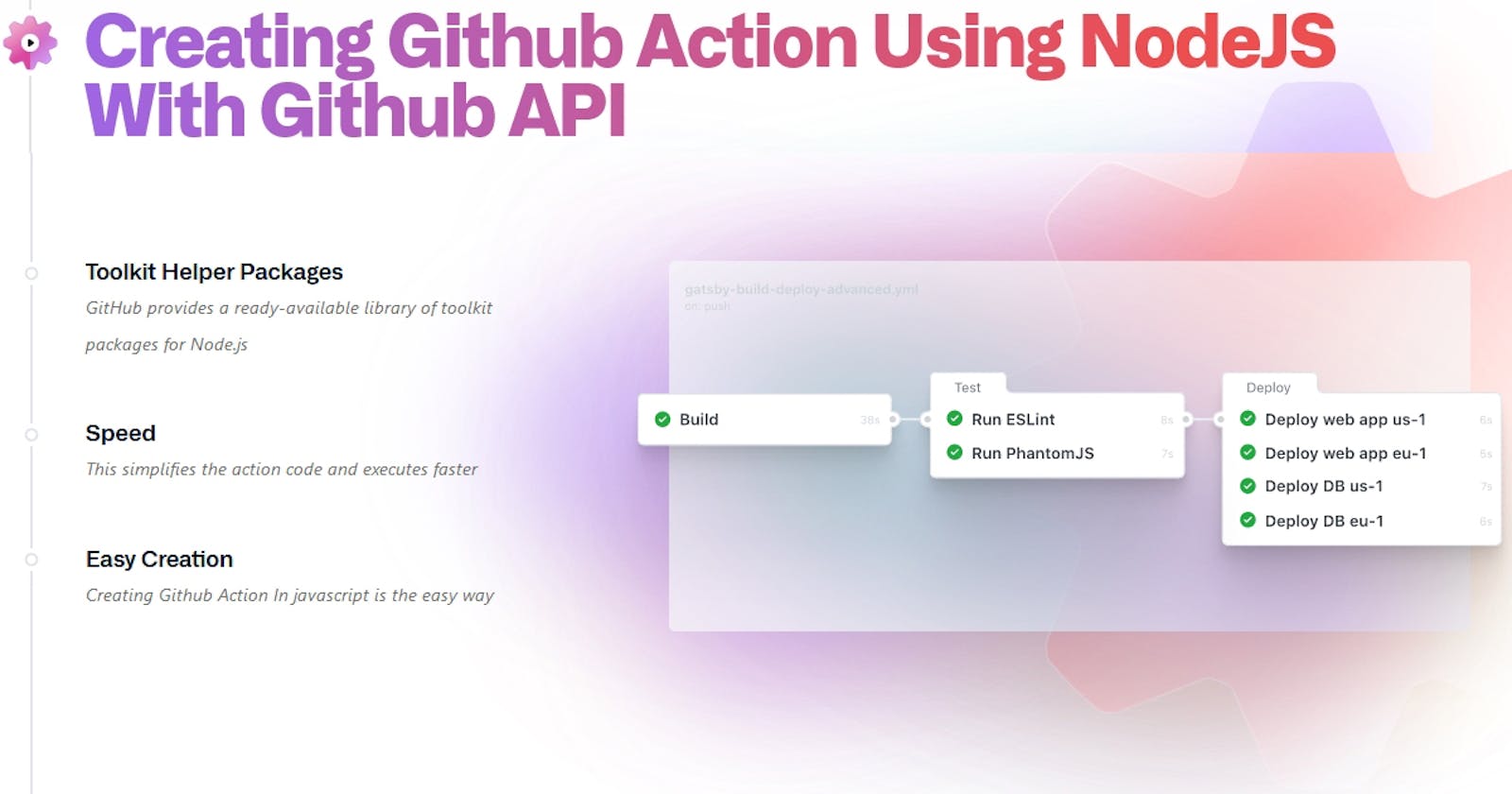In the previous blog titled How To Create A GitHub Action In NodeJS we understood on who to create Github Actions using NodeJS.
In this post we will learn how to create github action which interacts with Github API using actions/core AND actions/github npm packages
If you haven't yet read the previous blog post. please stop here. first read it and come back.
Prerequisites
- Download and install Node.js 12.x or newer, which includes npm
- Create a new repository on GitHub. For the purposes of this blog, we will be working with a repository titled
githubapi-nodejs-action - Clone the above repository to your local computer
- Once cloned, using terminal, change directory to the repository as below:
cd githubapi-nodejs-action - From your terminal, initialize the directory with a
package.jsonfile using:npm init -y @actions/coreNPM Package
Creating the Action Metadata file
Create a new file action.yml in the githubapi-nodejs-action directory with the following example code:
name: 'NodeJS Action With Github API'
description: 'use of the `@actions/core` & `@actions/github` package, which is advanced action demo'
runs:
using: 'node12'
main: 'dist/index.js'
Writing Action's Javascript Code
Since we are interacting with the Github REST API, we first need to import the @actions/github library into the core variable, since the client for the REST API is included in the Octokit
const github = require( '@actions/github' );
Since we are interacting with the API, we need an authentication token, which should be provided by the user in the workflow YML file. The token will be parsed to the REST API client, and the instance will be stored in a variable
if( typeof process.env.GITHUB_TOKEN === 'undefined' ) {
throw new Error( 'GITHUB_TOKEN ENV Variable Is Required' );
}
const octokit = github.getOctokit( process.env.GITHUB_TOKEN );
Information such as event name, payload and other repository information will be available through github.context, which we will save in the context variable
const context = github.context;
Now comes the actual action which creates a new issue in the current repository. Using the repository information in the context variable, we will add the issue to the repository.
await octokit.issues.create( {
...context.repo,
title: `New issue! | Action Runner ID #${process.env.GITHUB_RUN_NUMBER}`,
body: `Hello There,
Current Time Is : ${time}
`
} );
The complete code would look as below:
const core = require( '@actions/core' );
const github = require( '@actions/github' );
async function run() {
try {
if( typeof process.env.GITHUB_TOKEN === 'undefined' ) {
throw new Error( 'GITHUB_TOKEN ENV Variable Is Required' );
}
const octokit = github.getOctokit( process.env.GITHUB_TOKEN );
const context = github.context;
const time = ( new Date() ).toTimeString();
await octokit.issues.create( {
...context.repo,
title: `New issue! | Action Runner ID #${process.env.GITHUB_RUN_NUMBER}`,
body: `Hello There,
Current Time Is : ${time}
`
} );
} catch( error ) {
core.setFailed( error.message );
}
}
run();
Please note that Github does not check or install any dependencies. The action code you create must be full packaged containing all dependencies within.
To package your Github action, please install the vercel/ncc NPM package, which is a simple CLI for compiling a Node.js module into a single file, together with all its dependencies, gcc-style.
After installing the vercel/ncc package, you must include a
preparestatement in your package.json, which ensures that the compiler runs automatically each time you update the dependencies. Make sure to runnpm run preparebefore pushing to the repository each time.
"scripts": {
"prepare": "ncc build ./src/index.js -o dist --source-map --license licenses.txt"
},
The workflow file for this action, would look like the below:
name: "NodeJS Action With Github API"
on: [push]
jobs:
nodejs_action_with_github_api:
runs-on: ubuntu-latest
name: "A Advanced Node JS Action"
steps:
- name: "Create Issue With Current Time"
uses: learn-with-varunsridharan/github-action/githubapi-nodejs-action@main
env:
GITHUB_TOKEN: ${{ secrets.GITHUB_TOKEN }}
Output
When you run the above action with the exact code you should get output something like below
Workflow Output

Example Issue

You can download / clone the source code from below Github Repository
